

CLA creates copyright-scanning app. Mobile Tech and Libraries – 8 Great Presentations. October 2nd, 2012 by Ellyssa Kroski I was thrilled to give a keynote presentation at the International M-Libraries Conference 2012 last week in Milton Keynes, England.
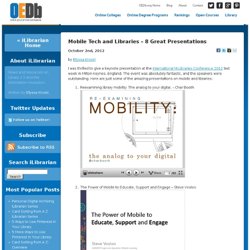
The event was absolutely fantastic, and the speakers were outstanding. Here are just some of the amazing presentations on mobile and libraries: Reexamining library mobility: The analog to your digital. – Char Booth The Power of Mobile to Educate, Support and Engage – Steve Vosloo Cross platform mobile development – Peter Friese < M libraries on the hype cycle: where are we? Mobiles for information skills. 2012 05-08-mibiblio-mlibs. M-biblio. Six scenarios where the iPad is trouncing the PC. I've made no secret of the fact that the iPad was not designed for people like me.
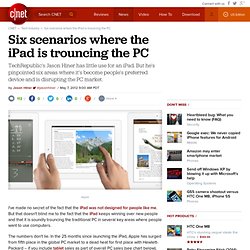
But that doesn't blind me to the fact that the iPad keeps winning over new people and that it is soundly trouncing the traditional PC in several key areas where people want to use computers. The numbers don't lie. In the 25 months since launching the iPad, Apple has surged from fifth place in the global PC market to a dead heat for first place with Hewlett-Packard -- if you include tablet sales as part of overall PC sales (see chart below). More than anything, this chart tells us that a lot of people are buying iPads at times when they would have purchased PCs. Whether those are second PC purchases for the den or the bedroom, or PCs for young kids or elderly parents who simply don't need a full computer, or iPads in place of laptops for traveling, we can't know for sure -- although we do know a little bit (more on that in moment). The problem with the iPad For reading and note taking, I love the iPad. 1. Mobile technologies in libraries : information sharing event.
Today I gave a talk at the Mobile technologies in libraries : information sharing event on “Creating a separate mobile library gateway with a framework called iUI – and why I wouldn’t do it again” (which I attempted to acronymise as “CASMLGWAFCiUIAWIWDIA”, but I don’t think it caught on).
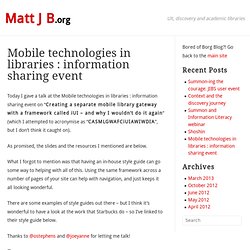
As promised, the slides and the resources I mentioned are below. What I forgot to mention was that having an in-house style guide can go some way to helping with all of this. Using the same framework across a number of pages of your site can help with navigation, and just keeps it all looking wonderful. Community. Mobile technologies in libraries: information sharing event, 8th May 2012. Mobile Infrastructure for Libraries. In response to the challenges and opportunities that the explosion in both ubiquity and power (both socially and technologically) of mobile devices presents to libraries and information providers in general, JISC has funded a programme of work to support UK Higher Education institutions in dealing with this mobile information environment.
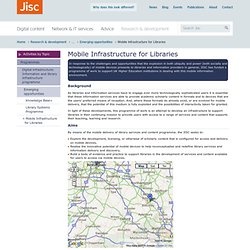
Background As libraries and information services have to engage ever more technologically sophisticated users it is essential that these information services are able to provide academic scholarly content in formats and to devices that are the users’ preferred means of reception. And, where these formats do already exist, or are evolved for mobile delivery, that the potential of this medium is fully exploited and the possibilities of interactivity taken for granted. Aims By means of the mobile delivery of library services and content programme, the JISC seeks to: View Mobile Infrastructure Projects1 in a larger map The Projects 1. 2.
About half of new web users have never used a PC to access the internet. Monday, April 30, 2012 9:52 pm, Posted by Martin Gicheru | Digital Media Topics: Mobile browser , Mobile users , Mobile users behaviour , mobile web , Opera mini , PC browsing Mobile web browsing has come of age, and we can see this by the fact that in a recent research where 34000 respondents comprising of mobile browsers globally by research firm On Device research.
Opera Software company recently published this white paper that gives some interesting findings: Why e-books will soon be obsolete (and no, it’s not just because of DRM) « Gyrovague. E-books will be obsolete within five years.
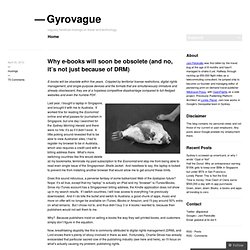
Crippled by territorial license restrictions, digital rights management, and single-purpose devices and file formats that are simultaneously immature and already obsolescent, they are at a hopeless competitive disadvantage compared to full-fledged websites and even the humble PDF. Last year, I bought a laptop in Singapore, and brought it with me to Australia. It worked fine for reading the Economist online and what passes for journalism in Singapore, but one day I searched for the Sydney Morning Herald, and there were no hits: it’s as if it didn’t exist. A little poking around revealed that to be able to view Australian sites, I had to register my browser to be in Australia, which also requires a credit card with a billing address there.
Does this sound ridiculous, a perverse fantasy of some balkanized Web of the dystopian future? Why? Digital makes copying free. ePub is an instructive case. Let’s recap. What will replace them? Welcome - Mobile apps and resources - Library Guides at Newcastle University. Blog post on using mobiles.